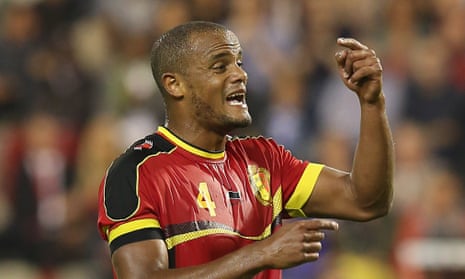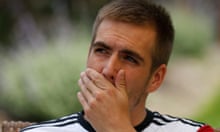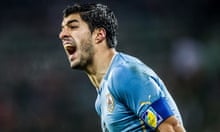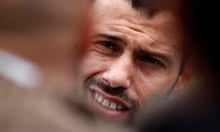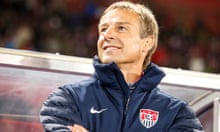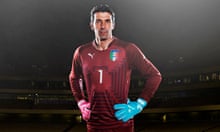For any elite footballer who finds himself an outcast from the summer’s all‑consuming sporting spectacle for one reason or another, the question burns. To watch or not to watch? Is it preferable to put on blinkers, seek out a desert island hideaway and pretend the World Cup is not happening? Is it less painful to try to extract yourself from its tentacles?
When Vincent Kompany made his debut for Belgium at the age of 17, his country had just missed out on qualification for the European Championship in 2004. Little did he realise he would have to wait a decade for the opportunity to grace a major finals. International tournaments would come and go and he would be confronted with the reality of how to deal with the fact he felt compelled to absorb it but profoundly frustrated to be on the outside looking in. So, did he tune in or not? “I would watch it because I am a football freak but I would hate every single minute of it,” he says.
“The one thing that made me get over it quickest was the fact that we never deserved to be there. If you don’t deserve to be there you have to deal with it. On many occasions we didn’t deserve to be there. I understood the fact I had to be a spectator.” His analysis is gracefully sporting.
For a lot of those barren years the impression that the Belgium team were fractured persisted. The way that the divisions have been obliterated, with solidarity a central force pushing the current group, sums up everything about the team and the effervescent mood that has flowed since their journey to Brazil was rubber‑stamped. Belgium racked up win after win in qualifying and the scenes when they defeated Croatia in Zagreb were of the purest happiness. Huddled in the middle of the pitch, they spontaneously broke into song, a Belgian version of Aquarela do Brasil as they bobbed up and down arm in arm.
A talented generation they may be but their fresh spirit is as fundamental as their ability. “There are many countries who can only dream of this kind of brotherhood that we have among us,” Kompany says. “The division before was mainly based on age. It was a conflict of generations, a conflict of the way we are now versus the way they were before. We all grew up together through the ranks and we are really friends. I get on with anyone in my team and I am really happy when I play with them. People around see this, it is still a symbol for the country. So whenever we do well, when we are in a positive light it does make people join our movement.
“Positivity attracts positivity. Our attitude has attracted so many people who wanted to do the same, who didn’t want to worry about the fact it is a difficult country to understand. People just wanted to celebrate and be happy – and that’s what makes us strong. It is the hardest thing to preserve because so much is linked to results but so far we have managed to show an honest image of ourselves and people have bought it. People have joined who have the same feelings about it. It is more than a club. It’s a bunch of friends.”
The notion of the national team acting as some kind of unifier strikes a strong chord with Kompany. He realises that to outsiders Belgium can come across as a confusing country in terms of its identity, as it has two major languages and two communities – the Dutch-speaking Flemish and French-speaking Walloons (and there is even a small group of German speakers which are officially recognised). “Maybe from the outside, Belgium looks complicated to understand,” he says, smiling, “but from the inside actually every country is complicated. I’ve been living in England for a while and I am still trying to figure out why we have Great Britain playing the Olympics together and England in football. Every country is complicated. But for us, if anything, I consider it kind of a wealth that we have different cultures, different ways of being. In all, it is all mixed somewhere. I consider it something that makes us more rich rather than something that gives us problems.”
This team carry an extra social element as so many players have multicultural roots. It embraces a new Belgium, much more diverse than the traditional linguistic and community split. Kompany is half Congolese, Axel Witsel has roots in Martinique, Marouane Fellaini and Nacer Chadli in Morocco, Mousa Dembélé in Mali, Romelu Lukaku’s father was capped by Zaire, Divock Origi’s father played for Kenya and Adnan Januzaj is from a Kosovar-Albanian family.
Kompany’s attitude is that he is absolutely committed to both sides of his bloodline. “I am 100% Congolese and 100% Belgian,” he says. “I am very proud of it. I represent Belgium in football and I represent Congo in so many different ways whenever I can. I don’t ever feel like justifying it. I am really happy to be both.”
The emergence of this new generation is in part down to encouragement from the Belgian federation to reform youth development but Kompany also believes that luck played its part. “It is not normal for such a small country who never really had a performing youth system to have so many young players come through at the same time,” he muses.
“What it has created is the belief in the country that if we keep working in the same way we can have more players coming through. The talent coming through after our generation is very good, like Januzaj and others who are not known to the wider audience. Belgium keeps producing players who are really good.”
It helps that they have the perfect band leader, too. Kompany assesses that Marc Wilmots, one of Belgium’s most iconic players and who also had a spell in politics, has played a key role in moulding them together and promoting this sense of the collective. “Our manager, when he used to be a player, had certain values you can still see in the way he coaches his group. He was always a fighter in his spirit. He was always a winner. He was proud to be there for his country. The group has caught on to those. We realised we could either keep on doing as we were doing before and always remember the national team as a bad experience, or we could just change everything around, and if we are lucky results will come and at least it will be fun. That’s what happened.
The biggest thing we are trying to create – which started before we were in the qualification – is we got the fans on board because we decided to change. But what we get the most is the fact people want us to carry on like this because they feel we are giving them something to be happy and proud about. What annoys me most is it is so easy to focus on negatives all the time. All you hear is a lot of people – whether it is industry leaders or politicians – complaining about everything. I don’t deny things are not always perfect but the stage it gets is huge compared with the simple things that make people happy like winning a football match. I can tell you that’s what people live for as well.”
It feels like a new age for Belgian football. Expectancy levels are unprecedented, and rather than a pressure it has become something the players are embracing. Some may find it illogical for Belgium, a country whose best World Cup finish (losing semi-finalists) came the year 28-year-old Kompany was born, to be ranked so highly among the favourites to win the competition. Most bookmakers give only four countries a better chance. Brazil, Argentina, Germany and Spain are the standout selections. But that still places Belgium above Italy, four-times winners, plus France, England, and Holland from the European pot. It also ranks them above talented South Americans nations such as Uruguay, Colombia and Chile.
Kompany remains typically level-headed and open-minded. “I consider four or five countries favourites and then that’s it,” he says. “You have the usual suspects, the ones you think of off the top of your head. Then it’s like, are we more favourite than Colombia? Are we more favourite than Uruguay? Are we more favourite than Chile? There are so many other teams that come into that category. If we do really well then we have a chance. If we just have a normal performance or a little bit less we will be out of it really quickly. Realistically we are not the favourites but in my mind every game I play, every competition I enter, I want to win it. Until it’s proven otherwise I don’t believe any other team is stronger than my team. On paper it is but I try not to be realistic. Belgium thinks we are going to be world champions, so the pressure is not too bad.”
Like any prize that has been longed for, and earned, Kompany cannot wait to kick a football in Brazil. There is a mood of grounded optimism. Belgium’s group is undeniably favourable. “Yes, it’s something we weren’t expecting,” he says.
“All of a sudden we are really favourites in our group. I don’t think we have been in a position like this before. We have always been the golden underdogs. We have a lot of responsibility – we have to get out of our group, although it will be tricky. The Russians always turn up at big competitions, the South Koreans you could be surprised about the amount of players doing really well in their leagues at the moment, and Algeria is always going to be the unknown. We are careful but at the same time we believe we can achieve a lot.”
At least this time, Kompany can actually do something about it. Having a say in this World Cup rather than watching from a distance is an opportunity to be relished.
Vincent Kompany is the International Ambassador for SOS Children’s Villages. For more information, please visit: www.soschildren.org
